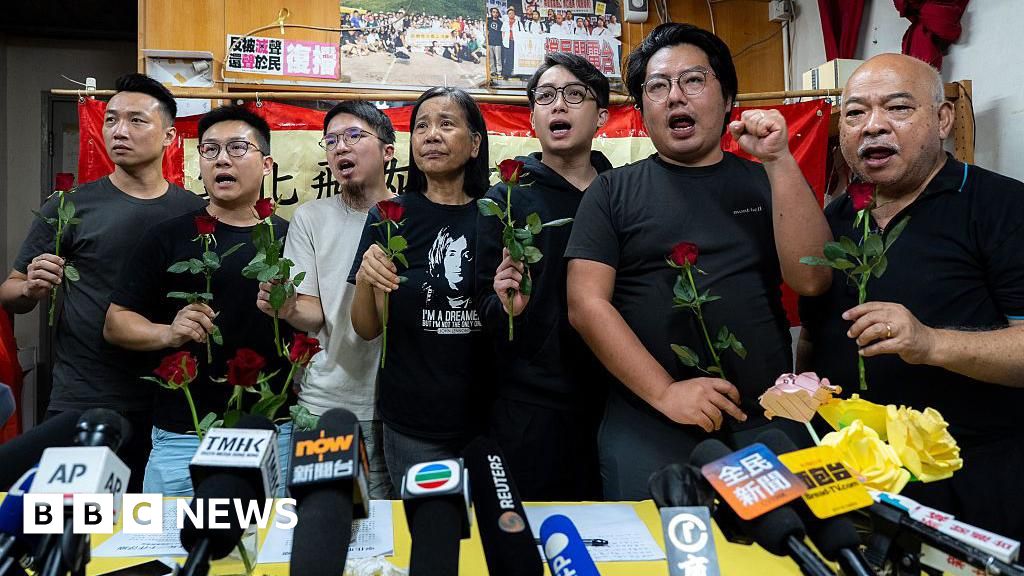On the wall of the League of Social Democrats office, the Chinese characters for freedom are spelt out with court admission slips.
Members of the party take turns speaking into a microphone connected to a loudspeaker. They stand in front of a banner that reads “rather be ashes than dust”, written in Chinese. Founded close to 20 years ago, the party is known as the last protest group in Hong Kong.
“The red lines are now everywhere,” Chan Po Ying, the chair of the party, tells the BBC. “Our decision to disband was because we were facing a lot of pressure.”



The CCP can’t hold its iron grip on power forever. One day HK will regain its ability to choose its own destiny. I only hope these people will still be around to see it.
The CCP is a pretty pragmatic organisation. They plan long term with decades in mind. Not to mention that US’ internal whackery is just easily handing over the torch to China this century. Unfortunately, it is hard to see how CCP will collapse. It might even take the next century for that to happen.
The CCP is no longer what it was decades ago, it has morphed itself into a weird amalgamation between communism and capitalism… and seeing how it can change itself without great upheaval shows it has a lasting strength that should not be underestimated.
It’s current strategy is that of patience and time, slowly it will erode away resistant forces or laws in a territory it wants to incorporate.
For the ccp time is not a pressing factor in this period, nor are human lives and living years of their ruling populace.
They currently have what they need and what they covet is extra, there is nothing that they urgently require.
Likely the same strategy is playing out in Taiwan, already there is a big political party that wishes to tighten bonds with “the mainland”, in 5-10 years time there will be a loud voice, created through years long whispers and propaganda, to join China directly as a state-aparte … soon after, the merger will be completed and laws and freedoms will be eroded away until Taiwan is as much China as Hong Kong is now.
And, for now, it looks like the West will bow out, they will have build their own semiconductor facilities, both Europe and the US are already working on this.
Which causes Taiwan to have less value to keep under its wing at any cost.
Looking at Hong Kong, I don’t think the CCP would ever allow it to go its own way again, it is as it is with Tibet…
The CCP is now what it was before. There was just a brief period inbetween horrible dictators after the last one died and before the new one dismissed the concept of term limits.
The one constant with China is change. There have been plenty of dynasties whose power waxed and waned over the years. Much of the current Chinese territory is being held through force, like East Turkestan or Tibet. As long as the people keep experiencing better living conditions they’ll tolerate the tyrannical governance of the CCP. The government’s betting big on censorship and shows of force, but I doubt it’ll suffice if enough civil discontent rises at once. China’s not a very resource independent country and all it takes is a shortage of food or oil to quickly destabilize its economy and its hold on power by extension.
Since much of the world still relies on China’s factories for so many general goods there’s a balance on its power through trade. As production and logistical chains continue to diversify outside its territories though, it’ll have a harder time keeping its citizens in check through economic growth. It’ll either have to start shifting into a service economy with good relations on its trade partners and neighbors for goods, or it may start to take a more nationalistic path. There’s an argument that both paths are actively being followed.
China heavily investing in trade and infrastructure with African countries may keep things peaceful as it continues to grow economically. This prosperity will only delay the inevitable though. People will eventually want to move away from factory work into more lucrative but limited service jobs as inflation starts to take hold due to an ever increasing amount of money in circulation. Its expected population decline will also start to kick in as the much higher population of older citizens would burden the comparatively smaller one child policy generation that would be needed to take care of them.
China promoting nationalism will distract the resentment of its people from the government to outside powers instead, but it would come with some severe geopolitical consequences. It’s already pissed off all its maritime neighbors by trespassing and overfishing in their waters, along with intentionally using its navy to attack fishing vessels. It’s also trying to claim vast swathes of international waters by dumping a bunch of sand and establishing forts on them all over the South China Sea. China and India routinely fight in border skirmishes using sticks and stones to try to keep the conflict from escalating. Eventually all the regional countries might decide to form a coalition and starve China out of its oil via a few strategically placed blockades either on the Strait of Malacca or along Sri Lanka. The economic damage over something like this might provide enough domestic unrest to force the government to change.